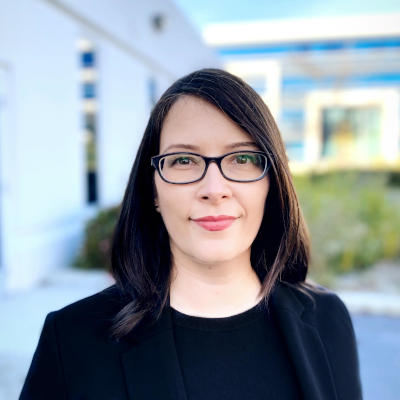Patrice Hall 2018: Augmenting Reality to Empower Consumers
Patrice Hall (MSSM '18) plots the future of virtual commerce.
By Mary Kilcoyne
If you've ever used a filter on Snapchat or an app to visualize how furniture would look in your space, then congratulations: You're an augmented reality (AR) consumer.
"When I first started working in AR, it was difficult to even explain what we were doing to the people using it; 'augmented reality' was not something that most folks were familiar with," Patrice Hall said. "Now, consumer understanding and expectation for AR experiences has transformed."
As the Director of Product at Dopple, a software platform that provides immersive 3D and AR experiences for retailers, Hall leads the product team with a focus on product strategy – a career ambition almost 10 years in the making.
"If you're not already working in emerging tech, it's tough to imagine how to get that first opportunity. When I was working as a UI/UX designer, I worked at an innovative agency, so I was familiar with the technology because I marketed it. I understood the space and showed my passion for the industry," Hall said.
Hall credits this passion for helping her land a job in 2013 at Marxent, a 3D visualization platform for furniture.
"I was impressed by how they were creating value. I wanted to build something instead of marketing the same thing over and over again, and I knew that this was my opportunity to become more tech-focused in my career," Hall said.
Hall started as a content strategist and project manager, then began shifting into a product role. She wanted to be more prepared to lead product creation though.
"I didn't know how to do that so I needed to find a program where I could learn how. I wanted the best training I could get, but I didn't want to uproot and interrupt my career. Carnegie Mellon was one of very few programs that offered a best-in-class education that I could do without leaving my home," Hall said.
Hall enrolled, from 2500 miles away in Ohio, as a part-time remote student in the Silicon Valley-based Master of Science in Software Management degree.
"It felt like a big investment, but I modeled out my ROI. I felt like I was not able to achieve what I knew I could in my career without having the foundational knowledge about how to build products," Hall said.
"Product is that pivot point between business strategy, engineering or architecture, and design. The practice of product is one of the reasons why I went to Carnegie Mellon. The Software Management program did that really well," Hall said.
As a part-time student and full-time employee, Hall balanced 50-hour workweeks with 20 hours of schoolwork each week.
"That's a lot of time spent on work and school. It was scalpel-precision time management. I was fortunate to have support from my husband and friends along the way, which made a huge difference in being able to get through," Hall said.
Hall completed the degree in August 2018 and accepted a Lead Product Manager role at Williams-Sonoma Inc., where she built out the strategic plan and vision for connected ecommerce and retail sales in the $1 billion home furniture segment.
"I gained experience in product management at Marxent, but I felt like I didn't have the expertise that I needed to be confident. The MSSM program taught me how to think strategically, which prepared me for Williams-Sonoma and is especially critical for my position at Dopple," Hall said.
"The Dopple platform is an innovative solution to a deep challenge for virtual commerce: people need to touch and move products before we buy. Shopping experiences that empower customers to feel creative build their confidence to purchase. When I met this team and learned about their vision, I knew I could not miss the opportunity to join them. At a startup, there are so many possibilities for next steps, which makes thoughtful product strategy a critical element to our success," Hall shared.

Four years after graduation, Hall still applies what she learned as a student.
"Sheryl Root delivered our first presentation at orientation. At the time, I had a couple years behind my belt in product, but most of my career had been in design. Sheryl laid out this map of how to build a strategy and how to plan strategic horizons. I have been using that thinking ever since, both in my work and in my personal life," Hall said.
The latest research estimates the market size for AR will climb to $461.25 billion by 2030, more than a 40% increase since 2020.
"More and more, users expect interactive, personalized experiences, and retailers want customers to have that and to feel confident in their purchases. When a technology becomes an expectation of everyday life, that's when you know it has reached mainstream," Hall said.
"One of the things that excites me about Dopple and one of the reasons why I went into product and why I went to CMU is I want to be a part of building the future. Working in AR/VR gives me the opportunity to help shape that, and that's exciting and rewarding to me."

